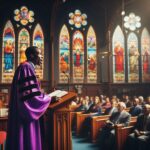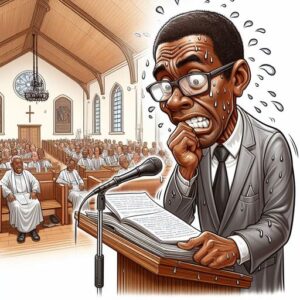Did you know that some pastoral leaders currently in ministry have not received the proper training? In every profession, there is a list of necessary skills to do the job successfully. To save their patients’ lives, surgeons must have theoretical knowledge, hands-on practice, and supervised training before cutting and stitching a patient. Being a pastor should be no different for the spiritual lives of their congregation. We live in a time when many people wear the title of pastor and hold a pastoral position but lack the skills to do a pastor’s job.
The Bible, the foundation of our faith, qualifies pastors.[1] These qualifications serve as a guide, emphasizing the importance of knowledge, wisdom, and understanding in pastoral service. The New Testament scripture outlines a pastor’s job “for the equipping of the saints for the work of ministry, for the building up of the body of Christ,”[2]they must receive the necessary training, practical tools, and resources to meet these requirements. Even though the Bible says this, why do some pastoral leaders still lack practical training opportunities?
The essential leadership responsibilities and skills for church pastors are the same for all United Methodist local pastors. There may be contextual differences and concerns to be addressed, but the basic skills needed are the same. Even though the UMC is clear about its educational requirements as outlined in the Book of Discipline, some pastors have been overlooked and have pastored for 10-30 years without completing the Course of Study Educational Program, which is the required denominational program.
The North Central District Rural Church Network (NCDRCN) was organized to address this oversight and the ministry needs of thirty-four rural churches, many of which are pastored by bi-vocational local pastors between Ocala and Gainesville, Florida. This ministry was to connect, collaborate, and cultivate the rural churches in the North Central District of the Florida United Methodist Conference.

The congregations of most rural churches lack skilled staff or volunteers to assist with day-to-day functioning. Thus, the pastor is responsible for carrying out the various tasks. Photo created with DALL·E, an AI system by Microsoft.
Pastors Wear Many Hats
Pastors today wear many hats in their leadership roles in the church and community. Most pastors enter the ministry understanding that they are called to preach the gospel, evangelize the lost, help with the revival of God’s people, feed and clothe the homeless, and visit the sick and homebound members, but over the years, the pastor’s responsibility has evolved, particularly within the rural church. Pastors are also expected to assume the responsibility for church administration, leadership, strategic planning, non-profit management, and the skill to address social justice issues in their community.

The disciples were taught to communicate with others, connect people to God, and minister to those in need. Photo created with DALL·E, an AI system by Microsoft.
For a pastor to equip the church for the work of ministry and to build up the body of Christ, training has now become a critical element of the foundational spiritual development of the congregation. Like a pastor, when Jesus called the disciples to “Come, follow Him, and He would make them fishers of people,”[3] the disciples were trained to minister to and serve the people. During Jesus’s time with the disciples, He used various practical methods to train the disciples. He communicated and connected with the disciples by using stories with imagery and illustrations they could relate to,[4] parables and questions to make them think,[5] discussions, debates, lectures,[6] and object lessons.[7] Jesus also modeled a life of leadership for them to follow, especially in making disciples.
Here are five reasons local pastors need an academic education and training.

Church decline occurs when pastors are not trained to handle the church’s concerns and meet the community’s needs. Photo created with DALL·E, an AI system by Microsoft.
1. Church Decline
With churches across America declining, the rural church is also in a downward spiral. Rural churches have a rich history; many still hold on to the good old days. This holding on to the past has made it difficult for the church to move forward, and some rural pastors do not have the tools or the resources to bring about the needed change. On that same note, in responding to the Confidence Assessment Questionnaire Survey,[8] many pastors acknowledged that they lack the skills to convince their members to commit to ministry and help confront the community and church’s problems. Without the needed training and resources, the local churches will continue to decline and be adversely affected in other ways.

Pastors lose influence when they cannot inspire people to live better lives. Photo created with DALL·E, an AI system by Microsoft.
2. Pastors No Longer Influence The Community
The church no longer influences the community as it once did. There was a time when the church made a difference in people’s lives spiritually, socially, and economically. “Threatened by socially divisive forces, small-church leaders appreciate resources to strengthen a community and congregational sense of belonging, purpose, and unity.”[9] Therefore, a local pastor must be trained and equipped with the tools to order the church’s life and guide and care for their congregation and community members.

Pastors must prepare their congregants to disciple others. Photo created with DALL·E, an AI system by Microsoft.
3. Pastors Cannot Ensure The Church Carries Out The Great Commission
The Great Commission Jesus gave to His followers was the most significant directive ever given to anyone in the history of the world.[10] Therefore, the pastor’s responsibility is to share their understanding and theological knowledge to ensure that the church members carry out the Great Commission to make disciples to build God’s Kingdom. While working with rural local pastors, their training deficits are apparent, as did the discomfort they experienced while attempting to lead their congregation in making disciples for Christ, but they expressed that they were doing their best.

Pastors become overwhelmed when expected to perform the tasks but lack training. Photo created with DALL·E, an AI system by Microsoft.
4. Pastor Burnout
Pastors have been observed walking away from the ministry in various denominational settings or experiencing burnout because they have too many tasks and little training.[11] When combining external dynamics, the social pressure of their church setting, and their work within the community, the potential for burnout becomes easier to see. Not being trained to equip the saints, these pastors singlehandedly take on most of the church’s responsibilities, which nearly kills them and their ministry. Equipping their congregation becomes challenging when the local pastors are not equipped themselves. Not only does the clergy suffer, but the church suffers as well.

With proper education, local pastors develop confidence and learn to trust, and their ministries thrive. Photo created with DALL·E, an AI system by Microsoft.
5. Fosters Distrust And Lack Of Confidence
When pastors lack the skills, resources, and training to do ministry work effectively, they will develop distrust and suspicion, which stems from a lack of confidence in their ability because of their limited skills and knowledge of operating effectively as pastors. To be effective in ministry is to thrive in ministry.
Without adequate educational training, pastors struggle, and the church is impacted in various ways. Research revealed that some of the NCDRCN’s local pastors are not adequately equipped for their profession and that additional training and resources are needed. The goal is to search for, define, or develop the best methods to offer the required education, training, and resources.

Pastors are professionals who have the potential to influence the spiritual lives of others for generations to come. Photos created with DALL·E, an AI system by Microsoft.
[1] 1 Timothy 3 & Titus 1(NASB).
[2] Ephesians 4:11-13 (NASB).
[3] Matthew 4:19, (NASB).
[4] Matthew 5:13, (NASB).
[5] Luke 11:5-7, (NASB).
[6] Matthew 19: 3-9, (NASB).
[7] Matthew 14:13-21, (NASB).
[8] Assessment Questionnaire Survey completed on October 21, 2021.
[9] Carl S. Dudley. Effective Small Church in the Twenty-first Century, 12.
[10] James R. Eby. World Impacting Churches: 10 Essential Characteristics for Changing the World and Finishing the Great Commission. (Mustang, Oklahoma: Tate Publishing & Enterprises, 2007), 43-44.
[11] C. J. Adams, H. Hough, R. J. Proeschold-Bell, J. Yao, and M. Kolkin. “Clergy Burnout: A Comparison Study with Other Helping Professions.” Pastoral Psychology, (66(2), (2016). 147-175. doi:10.1007/s11089-016-0722-4). 4.

